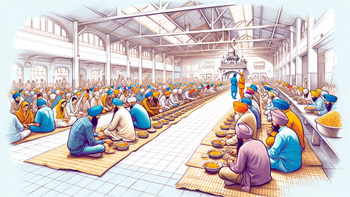Langar, a term that resonates deeply within Sikhism, refers to a community kitchen in a Gurdwara where a free meal is served to all visitors without any distinction of religion, caste, status, or ethnicity. This tradition, which is central to Sikh religious life, exemplifies the principles of equality, selfless service, and communal harmony. Established by Guru Nanak, the founder of Sikhism, Langar not only provides physical nourishment but also serves as a symbol of shared humanity and social equality. This article delves into the history, significance, and modern-day relevance of Langar in Sikhism and beyond.
Historical Origins of Langar
The tradition of Langar dates back to the time of Guru Nanak in the 15th century. Guru Nanak established Langar as a practice to break down social barriers and promote the idea of equality among all people. The concept was revolutionary in a society deeply divided by caste and class. Langar became a way for people of different backgrounds to sit together and share a meal, thus fostering a sense of unity and oneness.
The Philosophy Behind Langar
Langar is more than just a free communal meal; it embodies the Sikh values of selfless service (Seva), humility, and equality. By serving and eating together, participants in Langar demonstrate the eradication of social divisions. It is a practical demonstration of the Sikh belief in the equality of all human beings, regardless of their social or economic status. In Langar, everyone sits on the floor, symbolizing that all are equal in the eyes of God.
Langar in Practice
In Sikh Gurdwaras, Langar is prepared and served by volunteers. The ingredients are often donated by community members, and the preparation of the meal is done collectively, with everyone contributing their efforts. The meals served are vegetarian, ensuring they are acceptable to people of all faiths and dietary restrictions. Langar operates on the principle of shared responsibility and community participation, with everyone, regardless of their skills or background, encouraged to help.
Langar’s Role in Social Welfare
Beyond its religious significance, Langar plays an important role in social welfare. It provides food to those in need, offering sustenance and support to the poor, the travelers, and anyone else in need of a meal. In many places, Langar has become a refuge for the homeless and the destitute, exemplifying the Sikh ethos of caring for the needy and supporting the community.
Langar in the Modern World
In today's world, the tradition of Langar has adapted to meet new challenges. Gurdwaras around the world have expanded the scope of Langar to reach more people, including during natural disasters, emergencies, and in urban centers where homelessness and poverty are prevalent. Langar has also become a means of interfaith dialogue and community building, bringing people of different backgrounds together in a shared experience of service and fellowship.
Langar, as a tradition, transcends the boundaries of religion and culture. It embodies the universal values of compassion, sharing, and community service. In a world often divided by differences, Langar represents a beacon of hope and unity, reminding us of our shared humanity and the power of selfless service. As the world evolves, the principles and practices of Langar continue to inspire and impact lives, making it a timeless and relevant institution in Sikhism and beyond.
